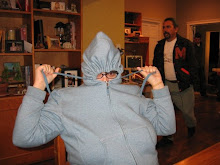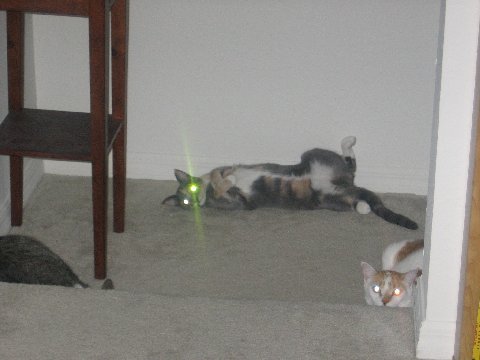 This book was a gift from a local attorney whose daughter used to work at our office. He passed out copies to all of the attorneys in our office, and what a gift! This book was WONDERFUL. It is one of the few books that I really think everyone should read. I finished it last night, completing it in a couple of weeks, which is quite an accomplishment for me, especially when talking about a non-fiction read.
This book was a gift from a local attorney whose daughter used to work at our office. He passed out copies to all of the attorneys in our office, and what a gift! This book was WONDERFUL. It is one of the few books that I really think everyone should read. I finished it last night, completing it in a couple of weeks, which is quite an accomplishment for me, especially when talking about a non-fiction read.One of the things I've learned in my years as a criminal defense attorney (and teacher) is how little the average citizen understands about the Constitutional rights we all share. The requirement of proof beyond a reasonable doubt is often considered one of those rights, but it does not actually exist anywhere in our Constitution. The essays in this collection highlight the need for the average joe to really understand that standard of proof, and to apply the mandate in every criminal case. The Casey Anthony trial, and the media circus that attended it, are a fine example of the rush to judgment that most people experience when they hear of someone accused of a heinous crime. The law, ironically enough, requires us to do the opposite: presume the accused innocent, unless the government proves BEYOND and TO THE EXCLUSION of EVERY reasonable doubt that the accused is guilty. That is a high bar, but not many folks understand just how high. And the reason behind that is that a person's liberty (and, in Florida, sometimes his life) is at stake.
This book is a celebration of our criminal justice system in all its glory. The book is divided up into several sections. The first section is titled "Beyond a Reasonable Doubt" and features attorneys, judges, and other players in the criminal justice system discussing the venerable standard of proof in criminal cases. The second section, "Equal Justice," is harder to pinpoint. I'd say the overarching theme is that all people are entitled to the same presumptions, regardless of their position. The third section, entitled "Quest for Truth," diverges a bit from the criminal justice system to explore more about the civil court system. This section was a bit boring for me, as I have never practiced civil law (and have no desire to do so). I'll admit that this section is where things got a bit muddy for me. I thought the whole book was about the criminal justice system, but this section was where it started to feel like Larry King just contacted a bunch of lawyers, said "reasonable doubt," and had them write an essay about whatever came to mind. The fourth section, called "Media and the Justice System," is exactly what it sounds like: an exploration of how the media can affect the outcome of a trial, especially in high-profile trials (like my Casey Anthony example, above) or trials of the rich and famous (OJ, Robert Blake, etc.) The fifth section, "Protect Victims," was geared primarily toward prosecutors, but I slogged through it. Sometimes it's a good idea to try to understand what makes the other side tick... The next section was called "Punishment in America" and focused on what comes after the trial - the punishment aspect. There were some interesting essays by those who were already convicted, as well as essays by those who call for reform of the punishment system to focus more on rehabilitation. The next section is "A Matter of Life and Death" - essays arguing for and against the death penalty. And finally, "What I Believe" - personal final thoughts for the book.
As I said, I LOVED this book, for the most part. It had its ups and downs, but overall I highly recommend it. I would give this book a five out of five Whatevers. I quoted so many passages to Facebook while I was reading. I also intend to go back to the first few essays to steal some ideas for my jury selections. It was a phenomenal reflection on the rights we all take too often for granted.
2012-10



1 comment:
I am totally going to have to mine this for jury selection questions, and maybe closing arguments. Glad you enjoyed it!
Post a Comment